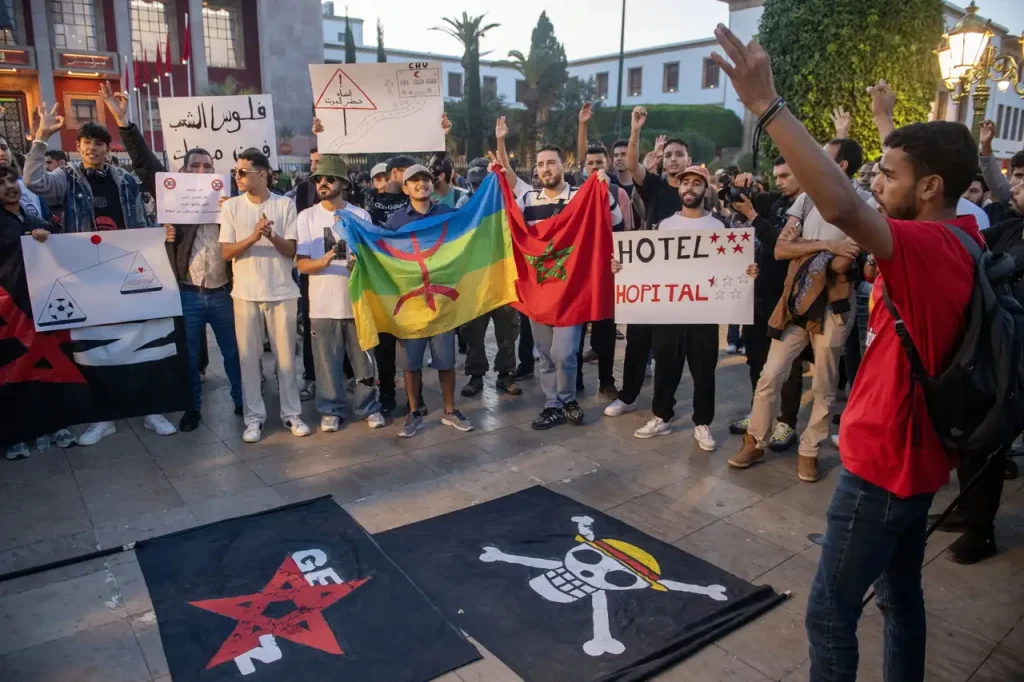On October 18, 2025, thousands of young Moroccans gathered outside Rabat’s parliament, reigniting the GenZ 212 movement after a 10-day pause. The youth-led group, launched in late September, seeks sweeping changes in education, healthcare, and economic policies, alongside action against corruption.
A protester captured the mood: “We’re here to plan our next steps and show the government we won’t stop until our lives improve with real reforms, not empty words.”
The rally followed King Mohammed VI’s recent parliamentary address, which touched on jobs and services but failed to directly address the protesters’ calls for systemic change. Many felt his speech lacked concrete solutions, fueling their resolve to keep pushing forward.
Roots of Discontent
Named after Morocco’s country code, GenZ 212 reflects frustration with misplaced government priorities. Massive investments in events like the 2030 FIFA World Cup contrast with underfunded schools and hospitals.
A devastating incident in Agadir, where eight women died in childbirth due to inadequate medical facilities, sparked the movement. With youth unemployment at 35.8% nationally 48% in cities and Morocco ranking 120th on the UN Human Development Index, young people feel neglected.
Using platforms like Discord (250,000+ members), TikTok, and Instagram, GenZ 212 has mobilized thousands across Rabat, Casablanca, Fez, Tangier, and Agadir. The decentralized group’s digital savvy has turned local grievances into a nationwide call for accountability.
Tensions and Setbacks
While early protests were peaceful, clashes erupted by October 1. In Lqliaa near Agadir, two protesters died during confrontations with security forces, who claimed self-defense after an alleged attack on a police station.
Three deaths total, over 500 arrests (including minors), and 263 injured officers marked the unrest. In Sale, protesters burned police vehicles and bank buildings, leading to 409 detentions.
GenZ 212 denounced violence, emphasizing nonviolent strategies. The Moroccan Human Rights Organization demanded the release of detainees and fair trials, citing constitutional protections for peaceful protest. Despite setbacks, the movement insists its resolve remains strong.
Government and Global Context
Prime Minister Aziz Akhannouch’s government offered talks, but protesters demand tangible reforms, inspired by youth-led successes in Nepal and Madagascar, where governments faced resignations.
Citing Article 47 of Morocco’s constitution, which allows the king to dismiss officials, GenZ 212 calls for the administration’s resignation over its failure to address social needs.
The protests, among Morocco’s largest in years, challenge the nation’s image as a stable North African hub. With 30% of its population aged 15–34, youth demands for investment in education and healthcare over infrastructure projects carry weight.
The movement’s growth from a small online group to a national force underscores the power of digital organizing.
Looking Forward
Protester Laila, 19, expressed cautious hope: “Change takes time, but we’re building something real.” Social media kept momentum alive during the pause, with thousands engaging online.
As protests continue, the government faces pressure to balance security with meaningful reforms to avoid further escalation.
Morocco’s youth remain steadfast, pushing for a future where their sacrifices lead to equity and opportunity, testing the nation’s ability to respond to a generation’s call for change.
READ MORE: Osimhen Remains Nigeria’s Top Football Star Despite Value Drop






